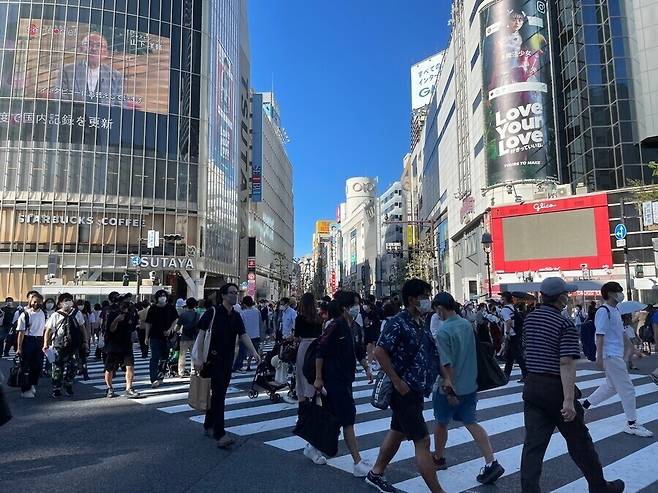Japanese wages fall below S. Korea's amid 30 years of stagnancy
이 글자크기로 변경됩니다.
(예시) 가장 빠른 뉴스가 있고 다양한 정보, 쌍방향 소통이 숨쉬는 다음뉴스를 만나보세요. 다음뉴스는 국내외 주요이슈와 실시간 속보, 문화생활 및 다양한 분야의 뉴스를 입체적으로 전달하고 있습니다.

A major issue in Japan’s House of Representatives election, scheduled for Sunday, is wages, which have stagnated for the past three decades in the country. While Japan is the world’s third-largest economy, its average wages are on the lower end of the Organisation for Economic Cooperation and Development (OECD), ranking 22nd out of 35 member states. Even South Korea has overcome a large gap to outpace Japan in the area.
“Not even Abenomics, [the economic policy] begun in the Abe administration, was unable to change that trend. The recession triggered when the bubble popped in the early 1990s continues today, a phenomenon known as the ‘lost 30 years,’” the Asahi Shimbun reported on Wednesday.
OECD data shows that Japan’s average wages last year stood at 4.24 million yen, converted at 110 yen to the dollar. The figure was calculated according to purchasing power, which takes into account the cost of goods.
In 1990, wages in Japan were higher than in the UK or France, but they’ve only risen about 4.4% over the past 30 years, pushing Japan down to 22nd place.
Japanese wages have increased by 180,000 yen (around US$1,600) since 1990. That pales in comparison to the US, where wages have increased by 3.39 million yen (US$29,700) over the same period.
Japanese wages have been lower than Korean wages since 2015, and the gap between them widened to 380,000 yen (US$3,300) last year.
“[Our wages] are horrible compared to other countries. They’re below average for advanced economies, and we’ve even been passed by our neighbor South Korea, which was once far behind us,” the Asahi Shimbun said.
A shift to irregular workers has been a major factor in depressing average wages. Japanese companies have increased the number of such workers, who can be paid less and are easier to lay off. In 1990, irregular workers accounted for just 20% of all wage earners; today, that percentage has risen to 37.2%.
According to 2019 data from Japan’s National Tax Agency, irregular workers have an average yearly income of 1.75 million yen (US$15,300) — less than half of the income of regular workers (5.03 million yen, US$44,100). The growing share of irregular workers, who are paid less, has dragged down the average wages of the workforce.
Another factor that’s keeping wages down is lower labor productivity. In 2019, Japan’s per capita labor productivity ranked 26th out of 37 major countries.
In 2018, Japan’s labor productivity dipped to 16th in manufacturing, which includes its flagship industry of automaking. Even at small and medium-sized enterprises that have been a reliable source of support, per capita labor productivity has been stuck at the same level since 2003.
By Kim So-youn, Tokyo correspondent
Please direct questions or comments to [english@hani.co.kr]
Copyright © 한겨레신문사 All Rights Reserved. 무단 전재, 재배포, AI 학습 및 활용 금지
- 순도 100% 국산 발사체 '누리호' 발사 사실상 성공
- [단독] 검찰 “내가 유동규에 ‘위례 3억원’ 전달” 남욱 진술 확보
- CJ ENM, SM 인수 가능성 가시화..이르면 다음주 발표
- 점검 기밀 포인트만 2000곳…숫자로 보는 누리호
- 해마다 최대 11m까지 뿌리 뻗치는 ○나무를 어쩌나
- 이재명, 국감 '선방'했다지만..민주당 안팎 "반전까진 역부족"
- FBI가 닭 트레이닝을? 전문가들이 '치킨 캠프' 찾은 이유
- 호박에서 1억년 전 게가 나왔는데..털끝 하나 다치지 않았다
- [단독] 경기도 '윤석열 처가, 양평 개발 특혜의혹' 감사 착수
- [전국지표조사] 이재명 35%-윤석열 34%, 이재명 35%-홍준표 32%